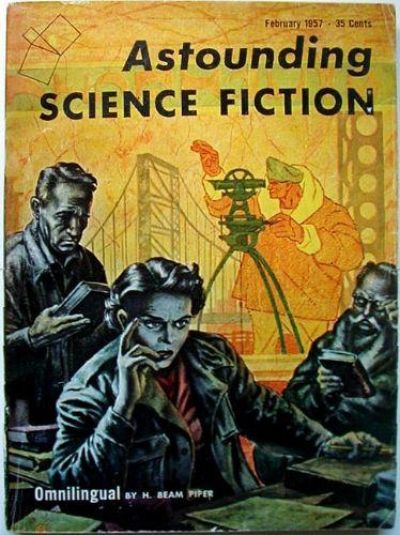Millennial Reviews XXIX: Omnilingual by H. Beam Piper (1957)
Omnilingual
By H. Beam Piper

13 Feb, 2000
0 comments
Omnilingual (from the collection Federation )
H. Beam Piper
Ace 1981
54 pages
That 1981 is very misleading: Omnilingual dates from much earlier. For some reason, Federation doesn’t give the details of prior publication. IMS Baen was running Ace’s SF line at that point and insufficient notation of prior publication used to drive me up the wall when Baen Books started out. I think it came out in 1957 in ASF.
Synopsis: Near the end of the twentieth century (Carr gives the year as 54 AE, AE = 1945), a post-Atomic War Earth is unified under the Federation. Advanced and wealthy, the Federation is funding interplanetary exploration. Omnilingual takes place on Mars where a fair-sized group of archaeologists are exploring the ruins left by a very recently extinct race of intelligent Martians. Mars is a dying planet, past the point of non-technological occupation by humanoid species, with the richest life found in the ancient seabeds, where depth and scaleheight give the animals enough air to breath.
Martha Dane is highly interested in the languages of old Mars. The problem is that like the Harrapan languages, no known intermediary exists between any human language and that of Mars, which makes the problem of translating Martian a seemingly insurmountable opportunity. Martha is under pressure to drop the line of research, both from friends who think it will damage her career and from Tony Latimer, who thinks it might damage the public standing of the expedition and therefore his career, Latimer being interested in other people purely in terms of what they can do for him.
The group of archaeologists are lucky enough to stumble onto one of the last sites occupied by civilised Martians. Elsewhere as the cultures decayed into barbarism, the physical artifacts of the high period were taken by the barbarians to be reused as fit the barbarians needs, leaving very little for the humans to study. This community was different, having possession of a building with an internal power supply and with easily defended perimeters. The building is in excellent shape and Martha is very pleased when two rooms full of books turn up.
Gradually, she pieces together some Martian words, if only very vaguely. She achieves her breakthrough when she discovers some Martian scientific texts: both English and Martian are letter based, she had previously worked out the numbering system and she happens across and recognises a periodic table. From the periodic table, which would be uniform from culture to culture because physics and chemistry describe invariant laws, she is able to get her bilingual which will allow her, with years and great effort, to translate Martian to Terran languages.
This is Piper’s best-known short story, I suspect. This might be why Dozois did not pick it for The Good Old Stuff in favour of another fine story with less exposure. I was too young to pick up Piper when he first came out but luckily for me, I was just the right age when Ace started reprinting Piper’s SF in the mid-1970s.
(Question for the truly well-informed folks: what did the Ace reprints miss? Aside from Murder in the Gunroom I mean.)
Piper is a pleasure to read. Competent enough style, strong female characters who are good at what they do, reasonable stories, although I differ with him on some historical points, since he was a big subscriber to the colonial exceptionalism model. It’s a real pity he killed himself in ’64. In some Paratime, he had a different agent or a friend who could have tided him over in a way compatible with Piper’s values. We might have had another decade or two of his stories. If he took Jack Williamson’s example, he might be writing today.
Omnilingual is a classic of its time. I wonder about a lot of the details: what if Martian didn’t use letters and a numbering system which sounds very akin to ours? How obvious is the Chinese presentation of a periodic table, for example (Real question: I have never seen the Periodic Table in Chinese)? It’s surprising the Martians were so humanoid, although intelligent species in Piper’s universe often were.
It’s less surprising if the Martians were our ancestors, as they are in the Paratime stories. If that is true, then I’d expect that Martian-Terran life was closely related, and that somehow exchanges must have occurred regularly, given that major families of animals are on both worlds. Mammals are mentioned explicitly. Of course, as recent as the 1960s, even more unlikely (indeed, flat out impossible) extra- terrestrial histories were proposed for humans so perhaps I shouldn’t hold Piper to standards later SF authors couldn’t meet.
I wonder about their plan to immediately flood the book depository with O2. I expect future archeologists will curse them for it, since the Martian atmosphere had preserved the books for 50,000 years.
I think he gives enough details of old Mars for the story. It’s a very dated Mars, of course, and the Martians are human enough he could draw from human history, but Piper was pretty good at drawing from history. A game you can play with Piper battles, for example, is to figure out which historical battles they correspond to.
We get almost no details about Earth. Other stories let us know that the Northern Hemisphere was flattened in the Three-Day War, or something like it, but historical details like that are lacking in Omnilingual for lack of space. It’s hard to say how advanced these folks are: I don’t recall noticing much that wasn’t obviously possible or going to be possible in 1957. Less interracial tension, more mixed marriages, which must have been pretty daring in the 1950s. Short, but well worth reading. It is a real shame most of Piper is out of print.
